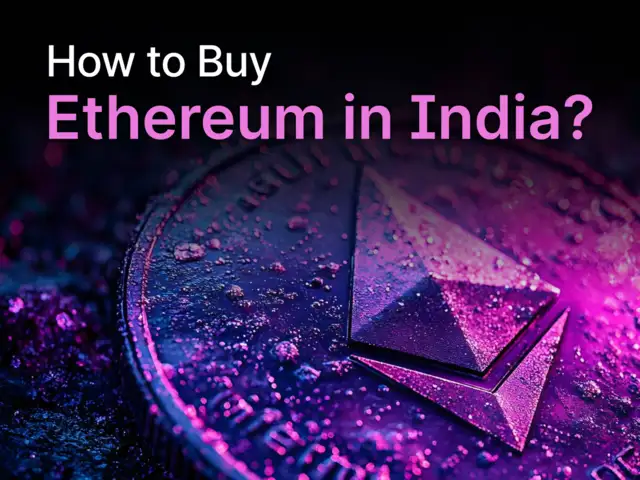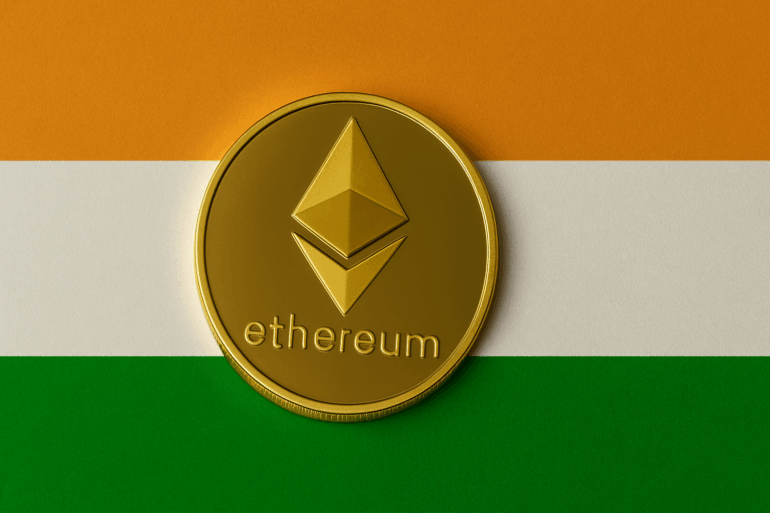- Beginner’s guide on how to invest in Ethereum in India. Simple steps, INR deposits, trusted exchanges, and today’s Ethereum price update.
Ethereum is a global network where developers can build applications that run without banks, app stores, or governments in the middle. Instead of being controlled by one company, Ethereum is maintained by thousands of computers across the world, making it secure and hard to shut down.
Its token, Ether (ETH), powers the network. You can use it as money, but more importantly, it acts as “fuel” that keeps applications running. That’s why Ethereum has become the second most valuable cryptocurrency after Bitcoin.
For Indian investors, Investing in Ethereum in India means having a stake in the backbone of decentralized finance, NFT markets, and Web3 projects.
The entry point is straightforward: Indian exchanges now allow you to buy ETH in rupees using UPI or bank transfer, often starting with just a few hundred rupees. The real key is picking a trusted platform, completing your KYC, and then securing your ETH in a digital wallet if you plan to hold it long term.
Is It Legal to Invest in Ethereum in India?
Yes, you can legally invest in Ethereum in India. The Indian government hasn’t outlawed cryptocurrencies such as Ethereum or Bitcoin, but it also doesn’t treat them as money in the traditional sense. In other words, you cannot use ETH to buy your groceries or pay bills, but you can hold it as an asset and trade it through registered platforms.
Indian investors need to remember taxation. Profits made from Ethereum, whether through trading or long-term holding, are taxed at 30%, and every trade above ₹10,000 attracts a 1% TDS (Tax Deducted at Source). These taxes are non-negotiable and apply whether your gains are large or small.
Ethereum falls under a tax-heavy regime. To stay compliant and avoid trouble, investors should stick to SEBI-compliant, Indian-based exchanges that follow KYC and AML rules. Platforms like WazirX, CoinDCX, and ZebPay make this process straightforward and ensure your transactions remain transparent.
How to Invest in Ethereum in India – Step-by-Step Guide
Investing in Ethereum in India is far simpler today than it was just a few years ago. With SEBI-compliant exchanges, UPI payments, and quick KYC verification, most beginners can get started in less than an hour. Here’s a process to follow:

Step 1: Pick a Trusted Exchange
The first step is choosing a platform where you’ll buy ETH. Stick to established names that operate transparently in India, such as WazirX, CoinDCX, ZebPay, or BuyUcoin. These exchanges allow you to trade ETH against INR, provide mobile apps for convenience, and follow the security standards expected by regulators.
Step 2: Open Your Account and Complete KYC
Once you’ve signed up, you’ll be asked to submit documents, typically your PAN card, Aadhaar card, and a live selfie. This is standard across Indian exchanges to comply with KYC (Know Your Customer) and AML (Anti-Money Laundering) rules. Without it, you won’t be able to deposit funds or start trading.
Step 3: Add INR Funds
After verification, you can deposit money into your account. The most common methods are UPI apps (Google Pay, PhonePe, Paytm), net banking, or IMPS/NEFT transfers. UPI is usually the fastest and cheapest option, making it easy to start even with as little as ₹500 or ₹1,000.
Step 4: Buy Ethereum (ETH)
Inside your exchange dashboard, search for the ETH/INR trading pair. You can place a Market Order if you want to buy immediately at the current price, or a Limit Order if you prefer to wait until Ethereum reaches your chosen entry level. Once the order is filled, your ETH will appear in your exchange wallet.
Step 5: Move ETH to a Secure Wallet
If you plan to hold Ethereum long term, don’t leave it sitting on the exchange. Transfer it to a private wallet for security:
- Hot Wallets like Metamask or Trust Wallet are easy to set up for smaller holdings.
- Cold Wallets like Ledger or Trezor are hardware devices that offer maximum protection if you’re investing larger sums.
What is the Minimum Amount Needed to Invest in Ethereum in India?
One of the biggest myths around Ethereum is that you need to buy a whole coin, which today costs more than ₹1.5 lakh. Just like you don’t have to buy an entire gold bar to invest in gold, you don’t have to buy a full ETH to get started.
Most Indian exchanges let you purchase a fraction of Ethereum. You can begin with as little as ₹100 to ₹500. That means even beginners with a small budget can own a piece of ETH and get exposure to the ecosystem.
Of course, the amount you invest should depend on your financial goals and risk tolerance. Crypto is still a volatile asset, so it makes sense to start small, understand how the process works, and then increase your position over time.
In short, the barrier to entry is low. You don’t need lakhs sitting in your account to become an Ethereum investor in India. All you need is a reliable exchange, a verified account, and the discipline to invest an amount you’re comfortable with.
Best Exchanges to Buy Ethereum in India
- WazirX – Backed by Binance, WazirX is one of the most liquid platforms in India. It offers ETH/INR trading, easy UPI deposits, and a mobile-first experience.
- CoinDCX – Known for its simple interface and wide selection of tokens, CoinDCX is beginner-friendly and allows investing in ETH with as little as ₹100.
- ZebPay – One of the oldest exchanges in India, ZebPay is known for its security-first approach and clean trading app.
- BuyUcoin – Supports more than 160 cryptocurrencies, including ETH, and allows multiple payment methods for INR deposits.
The right platform for you will depend on your needs, some investors prefer high liquidity, others prefer the lowest fees, while beginners may value a simple interface above all else.
Advantages and Risks of Investing in Ethereum In India
| Advantages | Risks |
| Global Adoption | Volatility |
| Fractional Investment | Tax Burden |
| Diversification | Regulatory Uncertainty |
| Innovation | Security Risks |
Ethereum Price Outlook in India
As of today, Ethereum price is $4,328.06 (around ₹3.6 lakh), making it the second-largest cryptocurrency after Bitcoin. For Indian investors, that price means Ethereum is trading below its all-time high of $4,953.73, reached just a month ago on August 24, 2025.
The short-term outlook is tied closely to global crypto sentiment and upcoming Ethereum network upgrades. While volatility remains high, Ethereum has consistently shown resilience by bouncing back after market pullbacks.
For long-term investors in India, the focus is less on daily swings and more on Ethereum’s role in powering DeFi, NFTs, and Web3 applications, areas that continue to see adoption worldwide.
In simple terms, Ethereum remains one of the few crypto assets with both strong current demand and future growth potential. Investors should, however, remember the high tax structure in India and manage positions carefully.
Ethereum in India FAQs
Yes, but only if you’re in it for the long term. ETH is volatile, but it’s also the backbone of DeFi and Web3. Start small, build gradually, and don’t chase quick wins.
Gas fees are transaction charges on the Ethereum network. They change with demand, sometimes just a few rupees, sometimes higher when the network is busy.
Quite a tiny fraction. At today’s price (around ₹3.6 lakh per ETH), ₹100 buys less than 0.00002 ETH. Still, it’s enough to get started.
Yes. Indian exchanges support UPI apps like Google Pay and PhonePe, as well as net banking and IMPS. UPI is usually the fastest.
All profits are taxed at 30%. On top of that, every trade above ₹10,000 has a 1% TDS. Keep records so you don’t get caught off guard.




